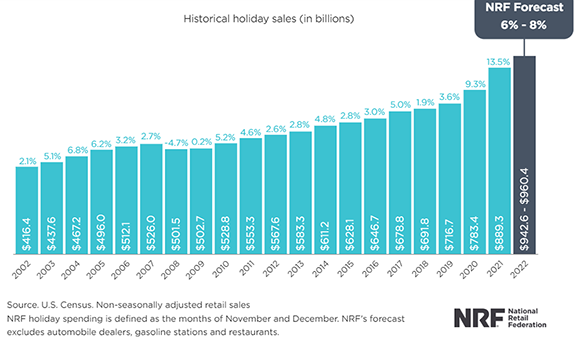Retail ETFs Gear Up for Black Friday

Black Friday might not be as frenzied as it used to be, but it’s still the busiest shopping day of the all-important holiday season. Over the past decade, retailers have increasingly offered deep discounts to entice shoppers into stores, and that has had major impact on the overall economy.
The retail holiday has slowly turned into Black November, with retailers extending deep deals all month long, but the day after Thanksgiving is still considered to be the start of the coveted shopping season.
"It is a social thing. I think people will [participate in it] to be out there together,” Anthony Johnson, head of the real estate management company Pegasus Group, said in a news report.
Black Friday will be the busiest shopping day of the season, followed by the Friday before Christmas and the day after Christmas, according to forecasts from Sensormatic Solutions.
The National Retail Federation says that 166.3 million Americans will shop during Thanksgiving weekend—a period that spans from Thanksgiving to Cyber Monday. If accurate, that would surpass the pre-pandemic high of 165.3 million shoppers from 2019.

Separately, the NRF forecasts that retail sales during the holiday months of November and December will climb 6-8% over 2021 levels, faster than the 10-year average of 4.9%.
(For a larger view, click on the image above)
“NRF’s holiday forecast takes a number of factors into consideration, but the overall outlook is generally positive as consumer fundamentals continue to support economic activity. Despite record levels of inflation, rising interest rates and low levels of confidence, consumers have been steadfast in their spending and remain in the driver’s seat,” NRF Chief Economist Jack Kleinhenz wrote in the report.
If that’s the case, it bodes well for retail ETFs. The SPDR S&P Retail ETF (XRT), the VanEck Retail ETF (RTH) and the Amplify Online Retail ETF (IBUY) have all fallen this year as investors questioned whether consumers would keep spending in the face of high inflation.
Year-to-date losses for the ETFs have ranged from 12% to 53%, the wide variation accounted for by the stark differences in the funds’ holdings.
XRT |
| RTH |
| IBUY |
|
Name | Weight | Name | Weight | Name | Weight |
Gap Inc. | 1.65% | Jd.com Inc. | 3.90% | Etsy Inc | 2.80% |
American Eagle Outfitters Inc. | 1.60% | Mckesson Corp | 3.86% | Ebay Inc | 2.73% |
Abercrombie & Fitch Co. Class A | 1.56% | Dollar General Corp | 3.30% | Chewy Inc | 2.72% |
Victoria's Secret & Company | 1.52% | Autozone Inc | 3.11% | Expedia Group Inc | 2.68% |
Macy's Inc | 1.44% | Sysco Corp | 3.03% | Copart Inc | 2.68% |
Buckle Inc. | 1.44% | Lululemon Athletica Inc | 2.55% | Shutterstock Inc | 2.66% |
ODP Corporation | 1.44% | Ross Stores Inc | 2.49% | Doordash Inc | 2.66% |
Burlington Stores Inc. | 1.41% | Dollar Tree Inc | 2.18% | Overstock Inc | 2.64% |
Urban Outfitters Inc. | 1.39% | Walgreens Boots Alliance Inc | 2.05% | Revolve Group Inc | 2.61% |
Ross Stores Inc. | 1.37% | Kroger Co. | 1.99% | Chegg Inc | 2.60% |
Barring a major setback in the broader markets, a strong holiday shopping season could be an upside catalyst for all three ETFs.

Next week, we’ll get a better sense of how the holiday shopping season is shaping up as data on sales and foot traffic during Thanksgiving weekend start to trickle out.
Recommended Stories

